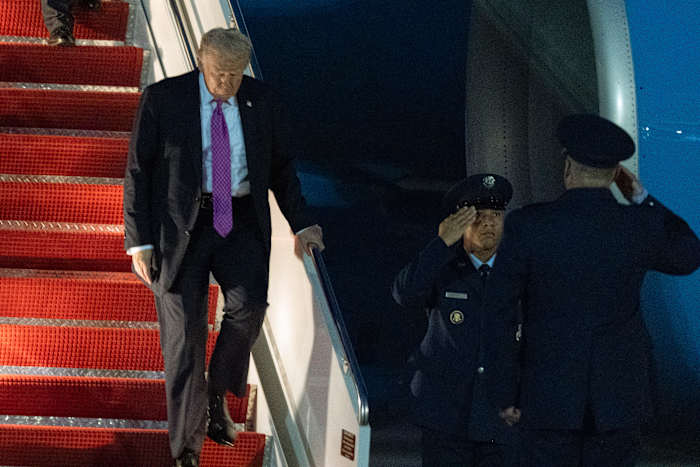Did Trump Confirm US Military Strike on Drug Boat from Venezuela?

Published: 2025-09-15 20:14:38 | Category: Trump GNEWS Search
The recent military action by the United States against a boat allegedly transporting drugs from Venezuela has sparked significant debate regarding national security and the legality of such strikes. President Donald Trump stated that the operation resulted in the deaths of three individuals aboard the vessel, labelling them as “narcoterrorists” responsible for the illegal drug trade that threatens American lives. This incident follows a previous military strike that claimed eleven lives, raising questions about the administration's approach to combating drug trafficking.
Last updated: 05 October 2023 (BST)
Understanding the Context of U.S. Military Actions Against Drug Traffickers
The use of military force against drug traffickers has become a controversial topic in U.S. foreign and domestic policy. This recent strike is not an isolated event but part of a broader strategy to combat drug trafficking from Venezuela, which has been increasingly viewed as a national security threat. Below, we outline some key takeaways regarding the implications of this military action:
- The U.S. military has actively engaged in operations targeting drug traffickers from Venezuela.
- President Trump claims these actions are vital to protect U.S. national security.
- There is bipartisan concern regarding the legality of using military force for law enforcement purposes.
- These operations have reportedly resulted in significant casualties among alleged drug traffickers.
- Legal experts are debating the implications of these strikes under international law.
The Justification for Military Strikes
President Trump’s administration has framed these military strikes as essential measures to combat the rampant drug trade that is linked to violence and addiction within the United States. In his Truth Social post, Trump labelled the drugs as “a deadly weapon poisoning Americans” and described the cartels as a threat to U.S. interests. This rhetoric underscores a growing trend of linking drug trafficking to national security rather than merely a law enforcement issue.
The justification for these strikes hinges on the assertion that drug cartels pose a direct threat to American lives and stability. The administration argues that military intervention is warranted to deter these groups and disrupt their operations. However, critics argue that such justification may extend beyond the intended scope of military engagement and encroach on law enforcement domains.
Bipartisan Concerns About Legality and Oversight
The recent military actions have not gone without scrutiny. Members of both the Democratic and Republican parties have expressed concerns regarding the legality of these strikes. Key questions arise about the extent of executive authority in authorising military force for what many view as law enforcement tasks. Critics suggest that using the military in this capacity may set a troubling precedent, blurring the lines between national defence and domestic law enforcement.
Senators have raised alarms about the potential overreach of executive power, suggesting that such actions could lead to a slippery slope where military force is used increasingly for domestic issues rather than traditional military engagements. The potential for misuse of military resources has led to calls for clearer guidelines and legislative oversight in military operations targeting drug trafficking.
The Impact of Military Engagement on Drug Trafficking
While the intention behind these military operations is to disrupt the drug trade, the effectiveness of such actions remains to be seen. Critics point to historical precedents where military interventions have not significantly curtailed drug trafficking. In many cases, such strategies may lead to retaliatory actions by traffickers or even exacerbate violence in the regions targeted.
Moreover, there is concern that military action can create a cycle of violence that further destabilises the region, making it more challenging to address the root causes of drug trafficking. Addressing the complex socio-economic factors driving drug production and trafficking in countries like Venezuela requires comprehensive strategies that go beyond military intervention.
What Happens Next?
As the Trump administration continues its military operations against drug traffickers, the dialogue surrounding the legality and efficacy of such actions is likely to intensify. There is a pressing need for an open discussion about the role of military force in drug enforcement and the implications for U.S. foreign and domestic policy.
Future military engagements will likely face increased scrutiny from Congress, particularly if they result in civilian casualties or appear to overstep legal boundaries. The ongoing debate may also lead to modifications in policy, with a potential shift towards more collaborative efforts with international partners to address drug trafficking comprehensively.
Conclusion
The recent military strikes against drug traffickers from Venezuela highlight significant challenges facing U.S. policymakers. As the administration asserts these operations are necessary for national security, the implications of military engagement in drug enforcement raise important legal and ethical questions. The effectiveness of such actions remains uncertain, and a multifaceted approach may be required to truly tackle the complexities of drug trafficking. How will the U.S. balance military action with the need for legal oversight and respect for international law moving forward?
#DrugTrafficking #USMilitary #NationalSecurity
FAQs
What is the justification for military strikes against drug traffickers?
The U.S. administration justifies military strikes by claiming drug traffickers pose a significant threat to national security and public safety, labelling them as "narcoterrorists" involved in the illegal drug trade.
What concerns have been raised about the legality of these military actions?
Concerns include the potential overreach of executive power and the appropriateness of using military force for law enforcement purposes, with bipartisan calls for increased oversight.
How effective are military operations against drug trafficking?
The effectiveness of military actions in curbing drug trafficking is debated, with historical examples suggesting that such strategies often fail to address the underlying socio-economic factors driving the trade.
What are the potential consequences of military strikes on drug traffickers?
Consequences may include retaliatory violence from traffickers, increased instability in targeted regions, and challenges related to civilian casualties, which can complicate international relations.
What alternatives to military action exist for combating drug trafficking?
Alternatives include diplomatic efforts, economic development initiatives, and international cooperation aimed at addressing the root causes of drug production and trafficking.



